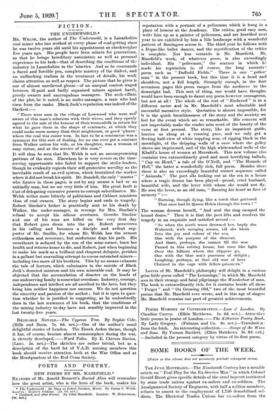POETS AND POETRY.
NEW POEMS BY MR. MASEFIELD.• READERS of Mr. Arnold Bennett's Buried Alive will remember how the great artist, who is the hero of the book, makes his • The Underworld : the Story of Robert Sinclair, Miner. By James C. Welsh. London : Herbert Jenkins. 12s. Gd. not] • Enslaved, and other Poems. By John Masefleld. London W. Heinemann. [6e. net.] reputation with a portrait of a policeman which is hung in a place of honour at the Academy. The critics, good easy men, write him up as a painter of policemen, and are horrified next year to see exhibited by him a Nile landscape with a wonderful pattern of flamingoes across it. The third year he follows with a Degas-like ballet dancer, and the mystification of the critics is complete. Not less versatile is Mr. Masefield. Mr, Masefield's work, of whatever genre, is also exceedingly individual. His " policeman," the manner in which hl made his reputation is, of course, the long narrativ= poem such as " Daffodil Fields." There is one " police- man " in the present book, but this time it is a head and shoulders, not a full length. Strangely enough, in the first seventeen pages this poem ranges from the mediocre to the downright bad. This sort of thing, one would have thought, would have been enough to daunt any poem however courageous, but not at all ! The whole of the rest of " Enslaved " is in a different metre and in Mr. Masefield's most admirable and successful narrative style. Quotation is almost impossible, for it is the quick breathlessness of the story and the anxiety we feel for the event which are so remarkable. His concern will not improbably make the reader miss most of the beauty of the verse at first perusal. The story, like an impatient guide, hurries us along at a running pace, and we only get a fleeting half-view of white toppling seas, of rigging black in the moonlight, of the dripping walls of a cave where the galley slaves are imprisoned, and of the high whitewashed walls of the Khalifs house of women at Marrakesh. This new volume also contains two extraordinarily good and most horrifying ballads, " Cap on Head," a tale of the O'Neill, and " The Hounds of Hell," the latter a wonderfully rich, full poem. Besides these there is also an exceedingly beautiful sonnet sequence called " Animula." The poet sits looking out at the sea in a house where a tragic drama has been played—proud, cruel husband, beautiful wife, and the lover with whom she would not fly. He sees the lover, as an old man, " Burning his heart at fires of memory " :—
" Burning, though dying, like a torch that guttered That once had lit Queen Helen through the town ! "
The woman drowns herself, " And soul the stag escaped the hound desire." Then it is that the poet lifts and resolves the tragedy in an exquisite and satisfied accord :-
" So when the ninth wave drowned her, haply she
Wakened, with merging senses, till she bleat Into the joy and colour of the sea, One with the purpose of the element.
And there, perhaps, she cannot fill the woe Passed in this rotting house, but runs like light Over the billows where the clippers go, One with the blue sea's pureness of delight ; Laughing, perhaps, at that old woe of hers Chained in the cage with fellow-prisoners."
Lovers of Mr. Masefield's philosophy will delight in a curious grim little poem called " The Lemmings," in which Mr. Masefield sees in their strange and fatal pilgrimage the Wanderlust of man. The book is extraordinarily rich, for it contains beside all these " Forget " and " On Growing Old," two of the most beautiful poems that Mr. Masefield ever wrote, and in this age of singers Mr. Masefield remains our poet of greatest achievements.


































 Previous page
Previous page